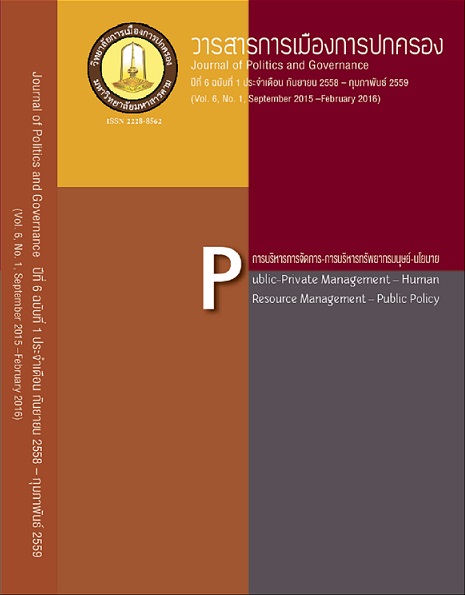Bottom-up Policy Advocacy: The Case of People’s Policy Proposals Advocating Four Laws for the Poor
Main Article Content
Abstract
The study contained in this article sheds light on the campaign of Four Laws for the Poor, consisting of: 1) the Draft Law on Community Rights to Manage Land and Resources, also known as the Draft Law on Community Land Title; 2) the Draft Law on the Land Bank; 3) the Draft Law on Progressive Land Tax; and 4) the Draft Law on the Justice Fund. The campaign of Four Laws for the Poor is a bottom-up public policy advocacy . The substance of the public policy embodied by the Four Laws for the Poor was developed on the basis of problems experienced by people relating to land injustice. Land is an important basic factor for all human beings. The structure of concentrated land holdings as well as government policies on land and forest management are important reasons causing a large portion of the population to not have land for production or experience the problem of state land overlapping their own production land, giving rise to longstanding conflicts between the people and the state. The Four Draft Laws for the Poor therefore reflect public policy that stems from demands for land reform to achieve sustainable justice. These demands have arisen from advocacy conducted by five social networks, among which People’s Movement for a Just Society (P-Move) plays an important role.
Article Details
References
ดวงมณี เลาวกุล และเอื้อมพร พิชัยสนิท. (มปป.). นโยบายและมาตรการทางการคลังเพื่อความเป็นธรรมในการกระจายรายได้. กรุงเทพฯ: ศูนย์บริการวิชาการเศรษฐศาสตร์ คณะเศรษฐศาสตร์มหาวิทยาลัยธรรมศาสตร์,
ศยามล ไกรยูรวงศ์. (2551). เสียงจากประชาชน การต่อสู้เพื่อสิทธิในที่ดิน กรณี ร้องเรียน2545-2550
และบทเรียนการตรวจสอบของคณะอนุกรรมการสิทธิในการจัดการที่ดินและป่า. กรุงเทพฯ: สำนักงานคณะกรรมการสิทธิมนุษยชนแห่งชาติ.
เพิ่มศักดิ์ จะเรียมพันธ์. (2555) . การเมืองของกระบวนการกาหนดนโยบายโฉนดชุมชน. วิทยานิพนธ์
รัฐศาสตร์มหาบัณฑิต, สาขาวิชาการปกครอง ภาควิชาการปกครองจุฬาลงกรณ์มหาวิทยาลัย.
เครือข่ายองค์กรคนจนเตรียมชุมนุมต่อเนื่องร้องรัฐแก้ปัญหา 14 ก.พ.นี้.(21กุมภาพันธ์ 2554).ประชาไท ออนไลน์.สืบค้นจาก http://www.prachatai.com/journal/2011/02/32992
พงษ์ทิพย์ สำราญจิตต์. (2553).บทเรียนและประสบการณ์ของเครือข่ายปฎิรูปที่ดินแห่งประเทศไทย.(19 พฤษภาคม 2553).เครือข่ายปฏิรูปที่ดินแห่งประเทศไทย.สืบค้นจากhttp://www.landreformthai.net/index.php?option=com_content&view=article&id=61:2010-05-19-09-23-28&catid=88:2010-03-21-04-30-09&Itemid=47
เอนก เหล่าธรรมทัศน์. (2539). มองเศรษฐกิจการเมืองไทยผ่านการเคลื่อนไหวของสมาคมธุรกิจ.
กรุงเทพฯ : สำนักพิมพ์คบไฟ.
นพพรรณ พรหมศรี.(2538). ที่ปรึกษาเครือข่ายสลัมสี่ภาค มูลนิธิพัฒนาที่อยู่อาศัย.13 มีนาคม 2558,สัมภาษณ์.
ต่างประเทศ
Dye , Thomas R. (2005). Understanding Public Policy. New Jersey : Prentice Hall.
Stivers,Camilian. (1990). Active Citizenship and Public Administration. in Wasley,Gary L.(1990)
Refunding Public Administration.California:Sage Publication.


